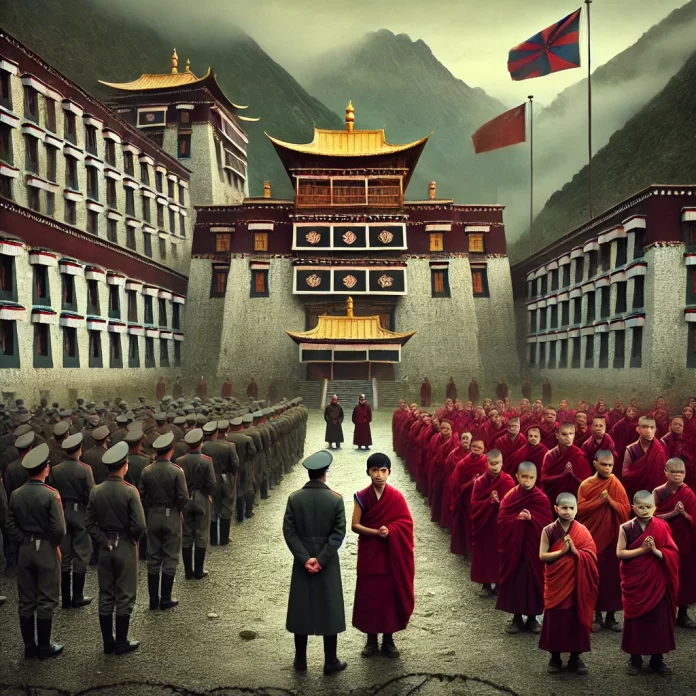In a harsh crackdown on Tibetan Buddhism, Chinese authorities have recently escalated actions against Tibetan monks and their religious education. Reports reveal that hundreds of young monks from Kirti Monastery in Ngaba County, Sichuan Province, are being forcibly relocated to state-run boarding schools.
Tibetan Monks Forced into State-Controlled Schools
These children, ranging in age from 6 to 17, have been moved into these government-controlled institutions where they reportedly face strict, prison-like conditions. At these facilities, the students receive education only in Mandarin, China’s official language, with all Tibetan language and culture heavily restricted.
Life in these boarding schools is highly controlled. The young monks are not permitted to leave the premises, communicate with their families, or even attempt contact outside the walls of the boarding school. Those who have tried to escape face serious repercussions and are treated as if they were criminals, enduring further restrictions upon return. These drastic measures came after the monastic school at Kirti Monastery was closed in July, affecting more than 1,000 young monks. Around the same time, Lhamo Kirti Monastery in Dzoge County shut down its school, impacting an additional 600 students. As a result, thousands of Tibetan children are being funneled into state-run institutions against their families’ wishes, where they undergo “patriotic education” programs.
China’s Detention of South Korean Sparks Tensions in Tech Espionage Battle
Forced Relocation and Isolation from Family
The closure of Tibetan monastic schools has not only deprived young monks of their spiritual education but has also forced them into environments designed to reshape their cultural identity. Families of these young monks face extreme pressure from Chinese authorities, who have coerced parents into signing agreements to send their children to government-controlled schools. Under these terms, children lose the option to receive traditional Tibetan religious education and are instead immersed in state-led curriculum programs aimed at enforcing loyalty to the Chinese government and the Communist Party. This so-called “patriotic education” emphasizes nationalism and allegiance to the state, effectively dismantling the influence of Tibetan Buddhism on the youth.
Philippines’s $56M Bold Thitu Island Upgrade to Counter China’s Expanding Claims
Once relocated to these state-run boarding schools, the children experience total separation from their families, with many not even allowed visits. Parents who attempt to visit their children encounter bureaucratic excuses or outright rejection, with authorities claiming that higher-level approval is needed. In some cases, parents are even threatened with imprisonment for seeking contact with their children. Reports indicate that medical care for the students is also inadequate, and the overall environment is restrictive and isolating.
Following these mass relocations, Chinese authorities have increased surveillance and imposed additional restrictions on Tibetan communities in the Ngaba County area. A high-ranking official from China’s United Front Work Department, a governmental agency that seeks to influence and control various social groups, has been stationed in the area to oversee the situation. This presence has heightened control over both the monastery and the surrounding Tibetan community, deepening tensions between Tibetan people and Chinese authorities.
Real reason china can not invade Taiwan
Restricted Communication and Increased Surveillance
Alongside these efforts to control education and movement, Chinese authorities have cracked down on communications between Tibetan Monks and the outside world. In September, four individuals were arrested for contacting Tibetans abroad, including two monks from Kirti Monastery and two laypeople. Reports indicate that authorities are trying to prevent any news of the crackdown from reaching beyond the region.
Additionally, officials have intensified monitoring and restrictions on communications within Tibetan communities, especially in Dzoge County. Authorities reportedly confiscated phones from monks and teachers at Lhamo Kirti Monastery, accusing them of spreading information about the school closures. This level of surveillance has added another layer of hardship for Tibetan families who are already separated from their children. For the Chinese government, controlling information flow is justified under claims of promoting national unity, but Tibetans argue that these actions violate their human rights and infringe upon their freedom to practice their cultural and religious beliefs.
The relocation of young monks and restrictions on Tibetan religious practices represent a significant challenge for Tibetans hoping to preserve their heritage. The surveillance and forced relocation imposed by Chinese authorities have left many Tibetan communities in a state of fear and confusion. While the Chinese government views these measures as part of a broader plan to foster loyalty to the state, Tibetans see it as an attack on their way of life, aimed at erasing their religious and cultural identities.


